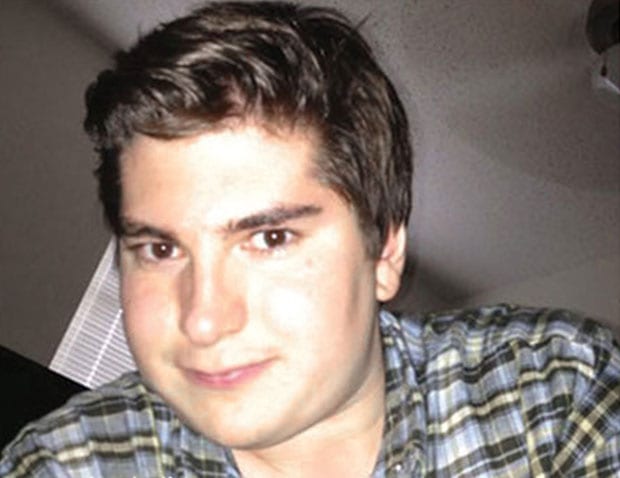Police liaison says there’s no indication of a hate crime; TCU GSA calls on university’s police to have policy for bias-motivated crimes
FORT WORTH — The validity of the “gay panic” defense in the murder of Texas Christian University student Stewart Trese was called into question this week.
Trese died Feb. 4 in his residence at the Grandmarc Apartments on TCU’s campus. His friend David Hidalgo, 21, later admitted to killing Trese and was charged with murder.
But in a jailhouse interview with WFFA/Channel 8 last week, Hidalgo claimed Trese came on to him. When he refused the sexual advances, Trese allegedly threatened him with a knife. In the jailhouse interview, Hidalgo admitted to stabbing Trese about five times in the chest and throat.
Trese, a Fort Worth native, was a senior marketing major and minored in Japanese. He was active in the Brothers Under Christ Fraternity.
He was 23.
Hidalgo is in jail under a $100,000 bond, according to jail records. He is scheduled to appear in court Feb. 26.
But the arrest warrant affidavit released Wednesday doesn’t mention sexual advances. Hidalgo allegedly told his mother that Trese attacked him in the bathroom with a knife, so he took the knife and stabbed him. She then called police, who arrested Hidalgo, the affidavit states.
Trese’s brother, Steve Trese, disputed Hidalgo’s story of self-defense, telling the Fort Worth Star-Telegram that Stewart Trese “was not that guy,” and someone in Hidalgo’s situation “would do anything to save his skin.”
LGBT advocacy group Fairness Fort Worth issued a statement Wednesday challenging the “gay panic” defense, when a person commits a violent act and then justifies it as a dismissal of sexual advances. The group is working with Fort Worth police and the FBI to ensure that the investigation is handled properly.
“Our homicide detectives know how to fully investigate a crime and not be distracted by blind-alley diversions,” FFW Vice President James McAlister said. “In addition, representations, in the same breath, of Hidalgo’s Christian faith, as if to suggest the victim had none, are completely outside the scope of facts in this crime.
“Sadly, Mr. Hidalgo may have attempted to steal more than Mr. Trese’s life; now he is also trying to steal Trese’s self-identity in his death,” he added. “We all have the right to define our sexuality and our lives, it is egregious that Hidalgo would usurp that right.”
Cpl. Tracey Knight, LGBT liaison for the Fort Worth Police Department, said the case is being investigated as a homicide because there is no indication the incident was a hate crime.
Texas’ hate crime statute is an enhancement law. It requires bias-motivated crimes, which protect “sexual preference,” to be enhanced to a higher charge.
Knight said she can’t address Hidalgo’s defense, only the police investigation.
“I can assure the LGBT community that Chief Halstead and I are following this case closely, and we are in direct contact with the homicide investigators,” she said. “I cannot reveal the details of an ongoing homicide investigation, but if there is any indication that the victim was a member or perceived to be a member of the LGBT community and/or he was targeted due to this perception, the prosecutorial enhancement of hate crime will be added to the charge of murder.”
FFW’s McAlister, a non-practicing attorney, said it’s a possibility the case could be prosecuted as a hate crime in light of the ”gay panic” defense. But whether prosecutors will seek the enhancement is yet to be seen.
“If he proceeds with a gay defense, that sort of opens the door to the fact that the orientation of the victim had something to do with the murder,” McAlister said.
Shelbie Rosenblum, president of TCU’s Gay-Straight Alliance, said Trese’s murder was “a tragedy that struck the TCU community.”
She added that the university’s LGBT community plans to work with the administration to implement policies to handle hate crimes “so the likelihood that a death like this decreases in the future.” TCU police currently don’t have procedures for handling a hate crime.
“The police of TCU need to have these protocols so they are able to protect 100 percent of the TCU population,” Rosenblum said.
TCU spokeswoman Lisa Albert said she would look into the university’s police procedures. She did not respond by press time.
Albert later emailed that TCU police undergo diversity training and discriminatory acts are in violation of the university’s student code of conduct.
“TCU’s Police Department utilizes best practices when addressing students’ safety and security including participating in ongoing training in many areas, such as diversity training, and utilizing a comprehensive approach,” Albert wrote. “If students are involved in incidents that are in violation of the student code of conduct, which specifically references discrimination, the TCU Police Department refers the student to Campus Life and the student would be subject to a range of disciplinary actions based on the facts of the incident. Additionally, if they are accused of a crime, University disciplinary action may also be applied to any legal action a student might face.”
Knight said she plans to speak to TCU’s LGBT community next week to address any concerns students or staff may have.
“Even though there are no indications that this was a hate crime, incidents like this remind us that there are those out there that mean to do us harm simply for whom we love,” Knight said. “We cannot let the fear consume us. We must continue to live our lives and be true to ourselves, but always remember, what we do individually reflects upon all of us as a community.”
This article appeared in the Dallas Voice print edition February 14, 2014.



